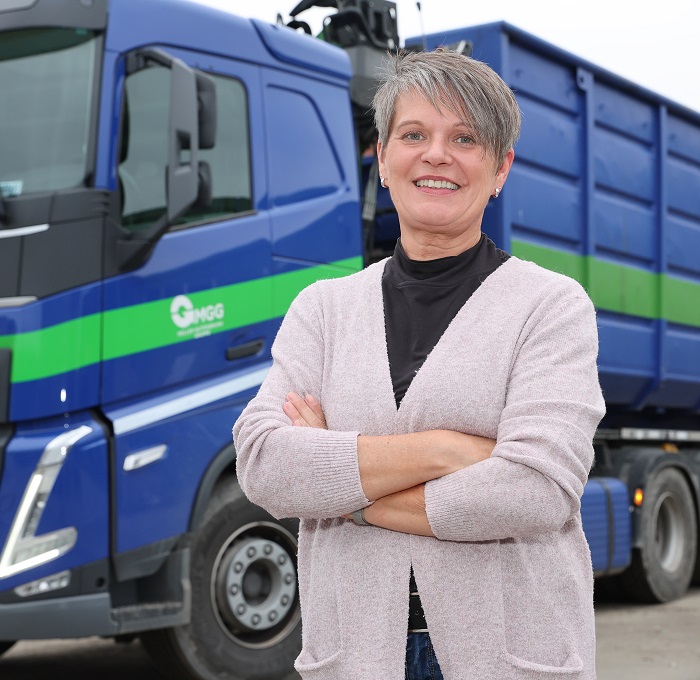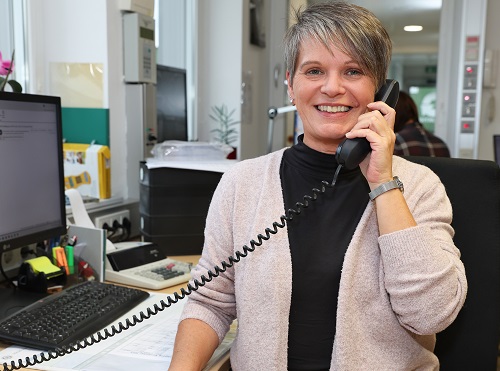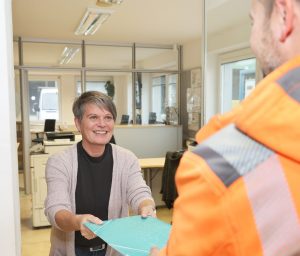Edith Washüttl has been with MGG Metran since 2005 and is part of Gunther Panowitz’s core team. The trained accountant joined the company by chance. Although she originally dedicated herself to the world of numbers, today she is passionate about the handling of lorries.

Whether incoming or outgoing goods, all trucks are dispatched by Edith Washüttl. No load passes the factory gate unseen.
Mrs. Washüttl, how long have you been working at Metran and how did you find out about your current job?
Edith Washüttl: I am a qualified accountant and really enjoyed my work for a tax consultant. When my husband and I decided to start a family, the plan was for me to stay at home with our children and only return to work when they started school. But things turned out differently – as they so often do in life. After a year and a half, I realised that I wanted to go back to work. So I looked for a job that was compatible with my family situation. In 2005, friends drew my attention to a vacancy at MGG Metran.
But the job offered was not that of an accountant, was it?
Edith Washüttl: That’s absolutely right. Nevertheless, I applied. And I haven’t regretted it to this day. I was offered a part-time job that was easy to combine with young children and family due to its proximity to my home town Mauer. After the interview with Gunther Panowitz, who is still my direct line manager today, I spontaneously decided to join the company. The area of responsibility sounded exciting.
What exactly do you do now?
Edith Washüttl: Together with a colleague, I am primarily responsible for handling all trucks coming into or leaving the plant. The drivers of lorries delivering mixed raw materials have to be allocated a place to dump the load. If goods are collected, it must be checked whether the lorry has been notified in advance and what or how much specifically needs to be loaded. In both cases, internal communication with colleagues at the site is extremely important so that loading and unloading can take place quickly and waiting and idle times can be kept as short as possible.
Every load, regardless of whether it is coming in or going out, has to be weighed, which is why the lorry drives onto the weighbridge. At my workplace, I am connected to the scales by computer and can operate them from the comfort of my desk – even in the cold season. Once the load has been weighed and an unloading point assigned, the lorry can be unloaded.
When a lorry collects goods, I take care of issuing the necessary transport documents while it is being loaded, which are handed over to the driver when it leaves the factory. As I am also responsible for the load and weighing, I make sure that the load weight is correct. Not only would overloading be very dangerous, but the penalties for drivers in the event of an inspection are extremely high.
That sounds like a lot of stress potential – how many lorries do you usually complete per day?

Edith Washüttl’s day-to-day work is turbulent and varied. The fact that she is equipped with strong nerves is enormously helpful.
Edith Washüttl: Thank God I’m blessed with good nerves. I can’t be shaken so quickly. So far this year, the average has been 20 lorries per day. That may sound feasible on the surface, but it’s difficult because the lorries don’t arrive spread out over the entire day, but mostly in clusters. On a busy day, there can also be up to 40 lorries passing the scales. On those days I’m exhausted in the evening and glad to be able to go home after work.
What else is part of your job?
Edith Washüttl: I take care of practically everything that my colleagues „bring in from outside“. For example, loader reports have to be entered or forklift logbooks updated. And, of course, everything that is weighed has to be entered into the warehouse accounting system. My former work as an accountant and my affinity for figures really come in handy here.
Another area of responsibility is assisting my direct boss Gunther Panowitz. Here I am entrusted with many exciting tasks that contribute to a balanced working environment.
You have been in the same job since you joined the company. How has the work changed despite this?
Edith Washüttl: When I started here in 2005, the volume was much lower. I was a part-time employee back then, and a colleague did the weighing in the afternoon alongside his main job, so to speak. That hasn’t been possible for a long time now. My hours were constantly increased and I’ve now been working full-time for years. Apart from the fact that considerably more goods pass through the scales, the bureaucratic effort has increased many times over. Today, a large number of documents and forms have to be filled out and signed before a truck or container can leave the factory. Organizing the customs documents alone often takes a lot of time. The customs service office in Amstetten, which is my point of contact here, also suffers from the increasing bureaucracy, which often results in unpleasantly long waiting times for drivers and freight forwarders. Apart from that, the same applies here as probably everywhere else: you have to move with the times and not close yourself off to innovations. That suits me very well.

Edith Washüttl carries out her daily tasks in a friendly and competent manner. She is known and loved for this – both internally and externally.
That’s a good transition: What does it take to do your job well? What makes you stand out?
Edith Washüttl: I am a resilient person who is not easily flustered. That really benefits me here, as things can get very turbulent at times and I’m faced with a lot of demands at the same time. Nevertheless, it’s important to maintain a friendly tone, and a nice smile doesn’t hurt. Flexibility is also one of my strengths, which is helpful in many situations.
Do you enjoy your job?
Edith Washüttl: Thank you for this question! Yes – it’s fun! It’s the variety, as I mentioned earlier, that I appreciate so much. As I am a very communicative person, in addition to my passion for numbers, I can live out all my strengths here. And: no two days are the same, so there’s no monotony.
Now that we have gotten to know your work, please tell us something about Edith Washüttl as a person.
Edith Washüttl: I am married and live with my husband in Mauer near Amstetten. Our children – our son is 25 and our daughter is 26 – are both already working and have moved out of the family home. A comfortable home is very important to me, which is why I enjoy looking after the house and garden in my free time. Some time ago, my husband and I discovered our love of dancing and we attend dance classes together. And then I also do voluntary work. I am a driver for the „Tafel“ food bank and have been working at the Amstetten Lions flea market for more than ten years.
How important is recycling and sustainability to you in your private life?
Edith Washüttl: Sustainability has always been very important to me, even before my time at Metran. Separating waste is a matter of course. We even have a small circular economy at home in certain areas. Two examples: the water from the dehumidifier is used for the ironing station and the neighbor’s chickens get everything they are allowed to eat.
One last question: what is the collection garbage can next to the staff entrance all about?
Edith Washüttl: It bothered me that we here at MGG Metran, virtually at the heart of recycling, simply throw the valuable raw material aluminum into the yellow bucket in the break room. When I came across this collection garbage bin, I quickly declared it an aluminum can collection bin, placed it at the staff entrance and asked my colleagues to dispose of their beverage cans here. Every now and then – as I did just now – I take a look in this dustbin to make sure that no incorrect waste has got lost among the aluminum cans. Waste separation is important to me. And when it comes to things that are important to me, there’s no way around it!
